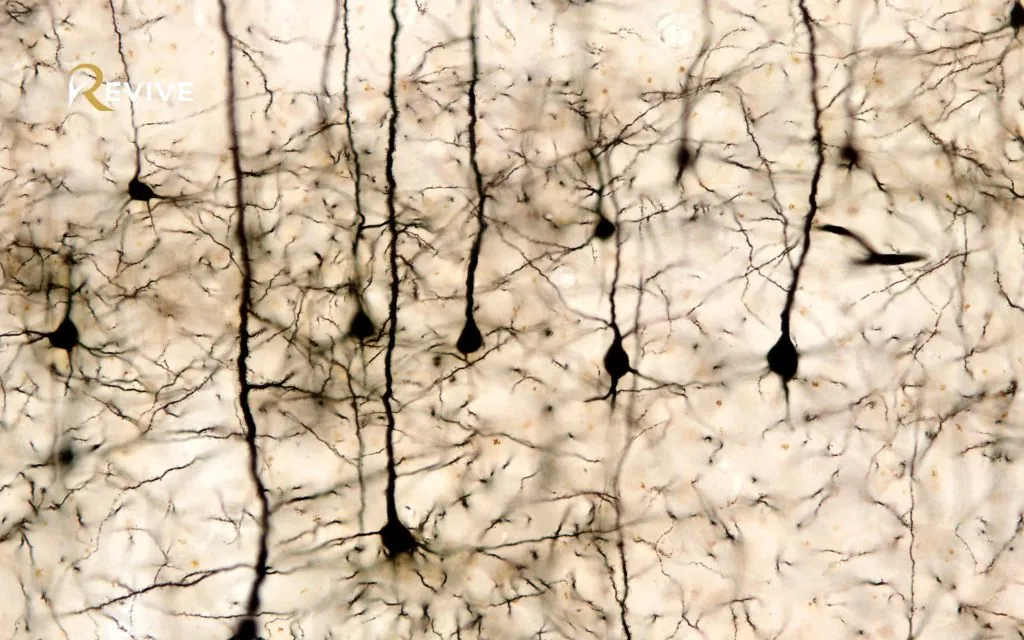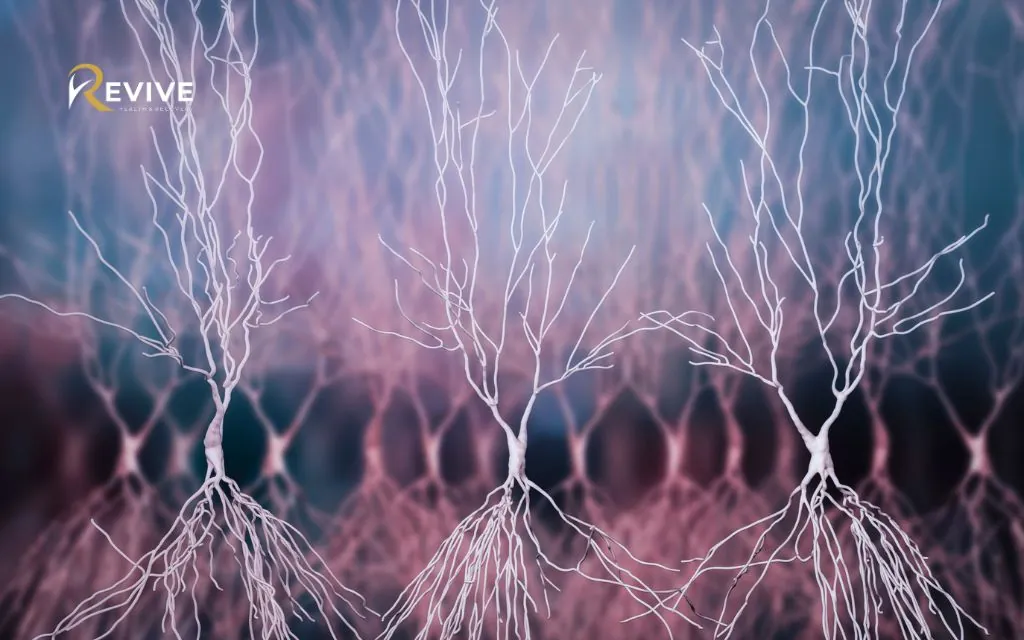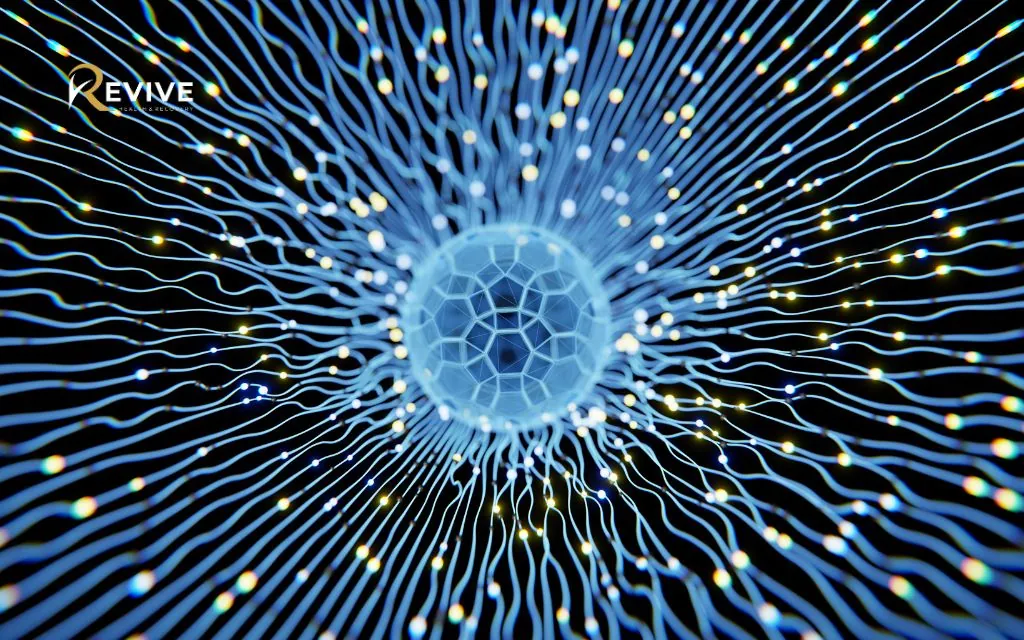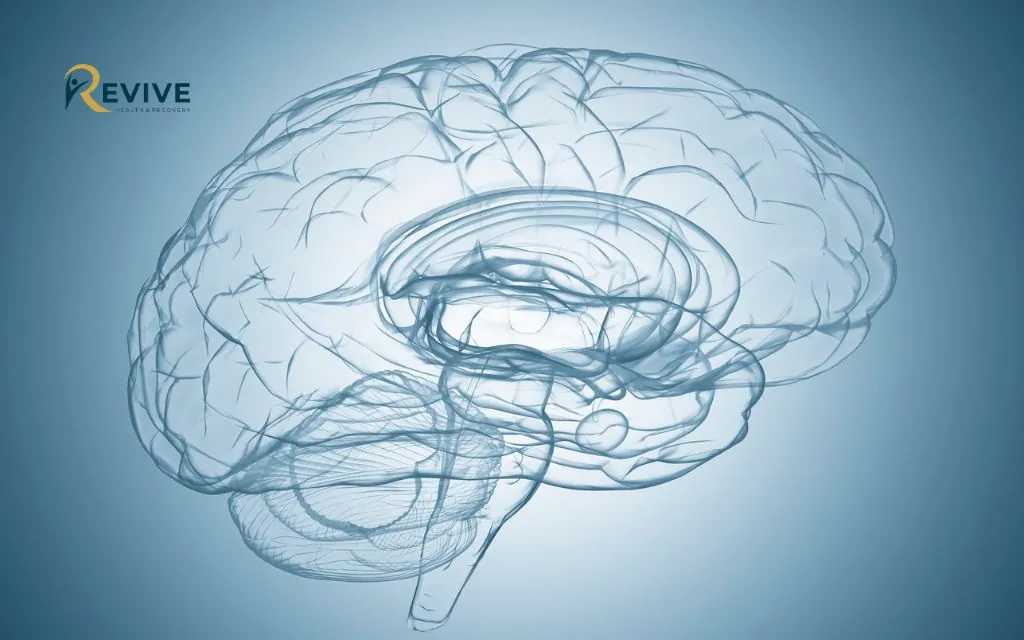Living with bipolar depression can feel like an endless cycle of challenging mood episodes and medication adjustments. For many Denver residents, traditional treatments haven’t provided adequate relief from depressive symptoms, leaving them searching for effective alternatives. Transcranial Magnetic Stimulation (TMS) therapy has emerged as a groundbreaking option for those struggling with bipolar depression. This non-invasive, FDA-recognized treatment uses magnetic pulses to stimulate specific areas of the brain, offering hope for many who haven’t responded to conventional approaches.
At Revive Health Recovery in Denver, we specialize in providing TMS therapy specifically tailored for bipolar depression, helping patients experience symptom relief without the systemic side effects of medications. As research continues to demonstrate TMS’s effectiveness for bipolar depression, more Colorado residents are discovering this innovative treatment option that could help restore balance, improve quality of life, and provide long-sought relief from depressive episodes.
Understanding Bipolar Depression and Its Traditional Treatments
When exploring TMS for bipolar depression, it’s essential to understand how this condition differs from other forms of depression. Bipolar depression represents the depressive episodes in bipolar disorder, creating unique treatment challenges that require specialized approaches.
What is Bipolar Depression?
Bipolar depression represents the depressive episodes in bipolar disorder. Unlike regular depression, these episodes alternate with periods of mania or hypomania. The condition affects brain circuits responsible for mood regulation, making standard treatments less effective.
People with bipolar depression often experience:
- Intense sadness and hopelessness
- Loss of interest in activities
- Cognitive difficulties
- Sleep disturbances
- Energy fluctuations
These symptoms can persist despite taking medication. Many patients find themselves searching for alternatives when traditional approaches fall short, leading them to consider TMS for bipolar depression.
Limitations of Traditional Bipolar Depression Treatments
Standard bipolar depression treatments include mood stabilizers, antidepressants, and psychotherapy. While these work for many, approximately 30-50% of patients don’t achieve adequate relief. This treatment gap makes TMS for bipolar depression an increasingly important option.
Traditional treatment challenges include:
- Medication side effects affecting daily life
- Limited effectiveness for treatment-resistant cases
- Risk of triggering manic episodes with antidepressants
- Long trial periods to find effective medications
These limitations drive the need for innovative approaches like TMS for bipolar depression.
How TMS Works for Bipolar Depression
TMS for bipolar depression represents a breakthrough in non-invasive treatment. This technology targets specific brain regions without the systemic effects of medication, making it particularly valuable for bipolar patients.
The Science Behind Transcranial Magnetic Stimulation
TMS for bipolar depression uses magnetic fields to stimulate nerve cells in the brain. The treatment focuses on the prefrontal cortex, an area crucial for mood regulation. Unlike medication that affects the entire body, TMS acts directly on brain circuits.
The magnetic pulses restore normal activity in underactive brain regions. This targeted approach helps regulate mood without causing widespread side effects. Research shows TMS for bipolar symptoms can effectively treat symptoms while maintaining the delicate balance needed to prevent manic episodes.
The TMS Treatment Process for Bipolar Depression
TMS treatment for bipolar depression follows a structured protocol designed for safety and effectiveness. Each session lasts 20-40 minutes, administered over 4-6 weeks. The process begins with brain mapping to identify optimal treatment locations.
During treatment, patients sit comfortably while the TMS device delivers precise magnetic pulses. Most people read, listen to music, or simply relax. The non-invasive nature means no anesthesia or recovery time.
Treatment typically includes:
- Initial consultation and brain mapping
- Daily sessions Monday through Friday
- Progress monitoring throughout treatment
- Follow-up care and maintenance sessions

Effectiveness of TMS for Bipolar Depression
Clinical research demonstrates impressive results for TMS for bipolar depression. Studies show significant improvement in symptoms for many patients who haven’t responded to other treatments, establishing TMS therapy for bipolar disorder as a viable therapeutic option.
Clinical Evidence and Success Rates
Recent research reveals promising outcomes for TMS for bipolar depression. Studies report 77% response rates and 41% remission rates among participants. These numbers represent hope for people struggling with treatment-resistant symptoms.
The FDA granted breakthrough device designation to TMS for mood disorders in 2020, recognizing its potential impact. This designation accelerates the approval process for treatments showing substantial improvement over existing options.
TMS vs. Medication for Bipolar Depression
TMS for bipolar depression offers several advantages over traditional medication approaches:
TMS Benefits:
- Fewer side effects than medication
- No weight gain or sexual dysfunction
- Effective when multiple medication trials fail
- Can combine with existing treatments
- Preserves cognitive function
Medication Challenges:
- Systemic side effects affecting whole body
- Risk of triggering mania with antidepressants
- Limited effectiveness in treatment-resistant cases
- Requires ongoing daily dosing
TMS for bipolar depression can be successfully combined with medication for enhanced effectiveness in treatment-resistant cases.
TMS vs. Other Treatment Options for Bipolar Depression
Understanding how TMS for bipolar depression compares to other treatments helps inform decision-making. Each option has specific benefits and considerations for bipolar depression treatment.
TMS vs. ECT (Electroconvulsive Therapy)
Electroconvulsive therapy remains effective for severe bipolar depression but requires anesthesia and can cause memory issues. TMS for bipolar depression offers a gentler alternative with fewer cognitive effects.
TMS Advantages:
- No anesthesia required
- Minimal memory impact
- Outpatient procedure
- Return to activities immediately
ECT Considerations:
- More invasive procedure
- Memory side effects
- Requires anesthesia
- Recovery time needed
Innovative TMS Protocols for Bipolar Depression
Advanced protocols enhance TMS for bipolar depression outcomes. Deep TMS uses a unique H1-coil design that reaches deeper brain regions than standard TMS. This technology may provide better outcomes for complex cases.
Accelerated TMS protocols deliver multiple sessions daily, potentially achieving results in days rather than weeks. The SAINT Protocol (Stanford Accelerated Intelligent Neuromodulation Therapy) represents cutting-edge neuromodulation therapy for TMS for bipolar depression.
Safety and Side Effects of TMS for Bipolar Depression
TMS for bipolar depression demonstrates an excellent safety profile. Understanding potential side effects helps patients make informed decisions about their care with TMS therapy for bipolar disorder.
Common Side Effects and Their Management
Most side effects from TMS for bipolar depression are mild and temporary. The most common include:
- Scalp discomfort at the treatment site
- Mild headaches following sessions
- Facial muscle twitching during treatment
These effects typically decrease as patients adjust to treatment. Revive Health Recovery provides comprehensive support to manage any discomfort and ensure patient comfort throughout the TMS for bipolar depression process.
Risk of Manic Episodes and Special Considerations
One concern with bipolar depression treatment involves triggering manic episodes. TMS for bipolar depression has a remarkably low risk (less than 1%) of inducing mania in bipolar patients. This safety profile makes TMS treatment for bipolar depression an attractive option for people with bipolar disorder.
Careful monitoring throughout treatment ensures early detection of any mood changes. Our experienced team specializes in bipolar care and understands the unique considerations for TMS for bipolar depression.
TMS Therapy for Bipolar Depression in Denver, Colorado
Denver residents have access to advanced TMS for bipolar depression treatment. Understanding local options and coverage helps patients access this innovative therapy.
Accessibility and Insurance Coverage
Insurance coverage for TMS for bipolar depression varies by provider and specific plan details. Many major insurers recognize TMS as an effective treatment for depression. Coverage often requires documentation of treatment resistance to traditional approaches.
Revive Health Recovery works directly with insurance companies to maximize coverage for TMS for bipolar depression. Our team handles prior authorization and appeals processes to reduce barriers to treatment.
Finding TMS Treatment in Denver
Denver offers several TMS providers, but expertise in TMS for bipolar depression requires specialized knowledge. Revive Health Recovery combines advanced technology with deep understanding of bipolar disorder complexities.
Our Denver location provides convenient access to cutting-edge Non-medication treatment for bipolar depression therapy. We offer flexible scheduling to accommodate work and family commitments while maintaining treatment consistency.

Patient Experiences with TMS treatment for bipolar depression
Real experiences from patients provide insight into the Non-medication treatment for bipolar depression journey. Understanding what to expect helps reduce anxiety and build confidence in treatment decisions.
Success Stories and Testimonials
Many patients describe TMS for bipolar depression as life-changing after struggling with treatment-resistant symptoms. One patient shared: “I finally feel like myself again. Transcranial Magnetic Stimulation for Bipolar Depression gave me hope when nothing else worked.”
Another described the experience: “The treatment was so much easier than I expected. I could read during sessions and went back to work right after.”
These stories reflect the potential for TMS for bipolar depression to restore quality of life when other treatments haven’t provided adequate relief.
What to Expect During Your TMS Journey
The TMS for bipolar depression experience follows a predictable pattern that helps patients prepare for treatment. Initial sessions focus on comfort and adjustment to the process. Gradual improvement typically begins within 2-3 weeks.
Patients often report:
- Improved energy levels
- Better sleep quality
- Enhanced mood stability
- Increased motivation
- Clearer thinking
Progress varies among individuals, but most people notice positive changes before completing TMS for bipolar depression treatment.
5 Reasons to Choose Revive Health Recovery for TMS Therapy
Selecting the right provider ensures optimal outcomes for TMS for bipolar depression therapy. Revive Health Recovery offers specialized expertise and comprehensive care for bipolar depression.
Specialized Expertise in TMS for Bipolar Depression
Our team understands the unique challenges of treating bipolar depression with TMS. We combine extensive experience with ongoing education about the latest advances in TMS for bipolar depression and brain stimulation therapy.
Dr. [Name] leads our TMS program with specialized training in transcranial magnetic stimulation and bipolar disorder treatment. This expertise ensures safe, effective care tailored to each patient’s needs.
Comprehensive Care Approach
We believe in treating the whole person, not just symptoms. Our comprehensive approach to TMS for bipolar depression includes:
- Thorough psychiatric evaluation
- Family involvement and support
- Coordinated care with existing providers
- Ongoing monitoring and adjustment
- Aftercare planning and support
This holistic approach maximizes treatment effectiveness and supports long-term recovery.
State-of-the-Art TMS Technology
Revive Health Recovery utilizes the latest TMS technology, including NeuroStar TMS and BrainsWay Deep TMS systems. These advanced devices provide precise, effective TMS for bipolar depression treatment with maximum comfort.
Our equipment undergoes regular calibration and maintenance to ensure optimal performance. We stay current with technological advances to offer patients the best available options for TMS for mood disorders.
Convenient Denver Location and Scheduling
Our centrally located Denver facility provides easy access for patients throughout the metro area seeking TMS for bipolar depression. Convenient scheduling accommodates busy lifestyles while maintaining treatment consistency.
We offer:
- Flexible appointment times
- Comfortable treatment environment
- Free parking
- Easy public transportation access
Compassionate, Patient-Centered Care
We understand that seeking help for bipolar depression requires courage. Our team provides compassionate, non-judgmental support throughout the TMS for bipolar depression treatment journey.
Every team member receives training in trauma-informed care and understands the challenges facing people with bipolar disorder. We create a safe, supportive environment where healing can occur.

FAQs About TMS for Bipolar Depression
Is TMS FDA-approved for treating bipolar depression?
The FDA granted breakthrough device designation to TMS for bipolar depression in 2020, though formal approval is still pending. This designation recognizes TMS for bipolar symptoms as a significant advancement over existing treatments. Revive Health Recovery stays current with FDA developments and offers TMS within appropriate clinical guidelines.
How does TMS therapy compare to medication for bipolar depression in terms of effectiveness?
TMS for bipolar depression shows response rates of 77% and remission rates of 41% in recent studies. Transcranial Magnetic Stimulation for Bipolar Depression can be effective when multiple medication trials have failed and offers fewer side effects than traditional medications. Revive Health Recovery can help determine if TMS for bipolar depression is right for your specific situation.
Will my insurance cover TMS treatment for bipolar depression in Colorado?
Insurance coverage for TMS treatment for bipolar depression varies by provider and plan. Many insurers cover TMS for treatment-resistant depression, including bipolar depression. Revive Health Recovery works directly with insurance companies to maximize coverage for TMS for bipolar depression and handles prior authorization processes. Contact us to discuss your specific coverage options.
What is the success rate of TMS for treatment-resistant bipolar depression?
Studies show impressive success rates for TMS therapy for bipolar disorder in treatment-resistant cases, with 77% of patients experiencing significant improvement. Success rates may vary based on individual factors and treatment history. Revive Health Recovery provides personalized assessments to help predict TMS for bipolar depression treatment outcomes.
Can I continue my current medications while receiving TMS therapy for bipolar depression?
Yes, TMS for bipolar depression can be successfully combined with medication for enhanced effectiveness in treatment-resistant cases. Our team coordinates with your existing providers to ensure safe, effective treatment combinations. We monitor for any interactions and adjust TMS for bipolar depression treatment plans as needed.
Take the Next Step Toward Relief from Bipolar Depression
Recovery from bipolar depression becomes possible with the right treatment approach. TMS for bipolar depression offers new hope for people who haven’t found adequate relief through traditional methods, providing an innovative path to wellness.
How to Get Started with TMS at Revive Health Recovery
Beginning your TMS for bipolar depression journey starts with a comprehensive evaluation. Our team assesses your treatment history, current symptoms, and overall health to determine if Magnetic therapy for bipolar disorder appropriate for your situation.
The evaluation process includes:
- Detailed psychiatric history
- Current medication review
- Symptom assessment
- Insurance verification
- Treatment planning discussion
Contact Revive Health Recovery Today
Don’t let treatment-resistant bipolar depression control your life. Revive Health Recovery offers hope through innovative TMS for bipolar depression therapy designed specifically for your needs.
Call (303) 268-4655 to schedule your consultation and learn more about Non-medication treatment for bipolar depression. Our compassionate team is available 24/7 to answer questions and help you take the first step toward recovery.
You can also email us at contact@revivehealthrecovery.com or visit our Denver location at 1427 S Federal Blvd, Denver, CO 80219.
Your journey toward healing starts with a simple phone call. Contact Revive Health Recovery today and discover how TMS treatment for bipolar depression can transform your experience with bipolar depression.



